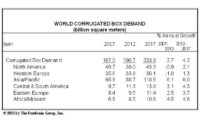US Demand for beverage containers to reach 265 billion units in 2017

US demand for beverage containers is expected to increase 1.7% annually through 2017 to 265 billion units, valued at $29.1 billion. Unit gains will be driven by ongoing consumer preference for single-serving containers in many markets, increasing interest in alternatives to carbonated soft drinks, and a proliferation of new product introductions accompanied by aggressive marketing campaigns. In addition, favorable demographic trends, such as healthy gains in millennials and in the older population, will bolster demand for certain beverages (e.g., wine) and related containers. These and other trends are presented in Beverage Containers, a new study from The Freedonia Group, Inc. (freedoniagroup.com), a Cleveland-based industry market research firm.
Plastic containers will remain both the largest and fastest growing segment, with gains supported by good prospects for polyethylene terephthalate (PET) containers in the ready-to-drink (RTD) tea, sports drinks, and other noncarbonated RTD beverage markets. Plastic containers will also benefit from solid growth in the bottled water market, although increasing maturity and environmental concerns related to the volume of PET bottles in landfills will hold back growth.
Metal beverage containers, the second largest beverage container type in unit terms, will register slow growth through 2017 as a result of declining soft drink production and meager increases in beer production. However, gains will be helped by robust expansion of the energy and specialty drink market and product innovations such as vented and shaped cans.
Glass beverage container demand is forecast to post modest gains, supported by the entrenched position of bottles in wine packaging and solid growth in RTD tea. Demographic trends, particularly above average growth in millennials and the baby boomer population (key consumers of wine), will also bolster glass container demand despite increased competition from other container types. Paperboard container demand will decline as a result of further supplantation of gabletop cartons by plastic bottles, especially in the milk and fruit beverage markets. However, good prospects are anticipated for paperboard containers in markets such as soymilks and other nondairy milk alternatives, wine, and sports beverages.
Looking for a reprint of this article?
From high-res PDFs to custom plaques, order your copy today!






